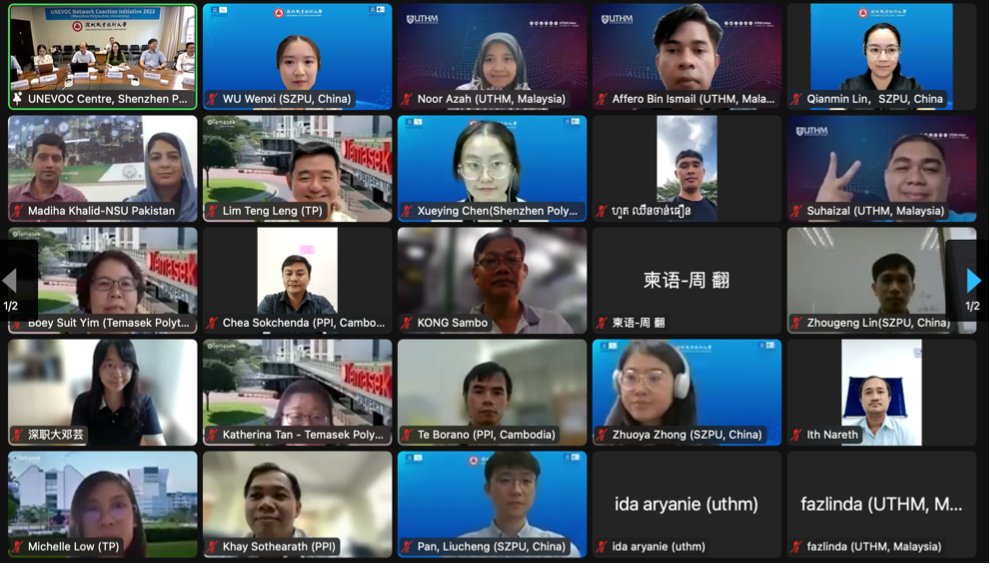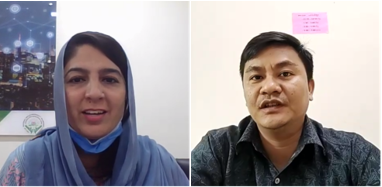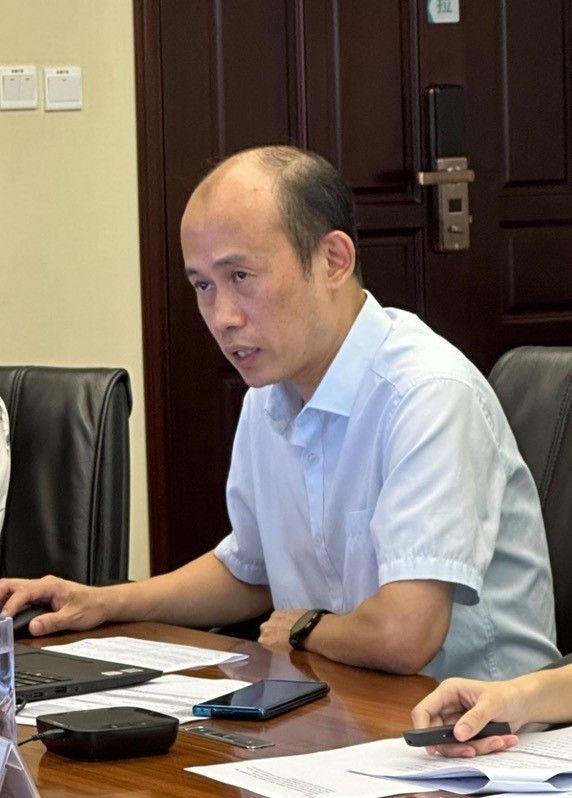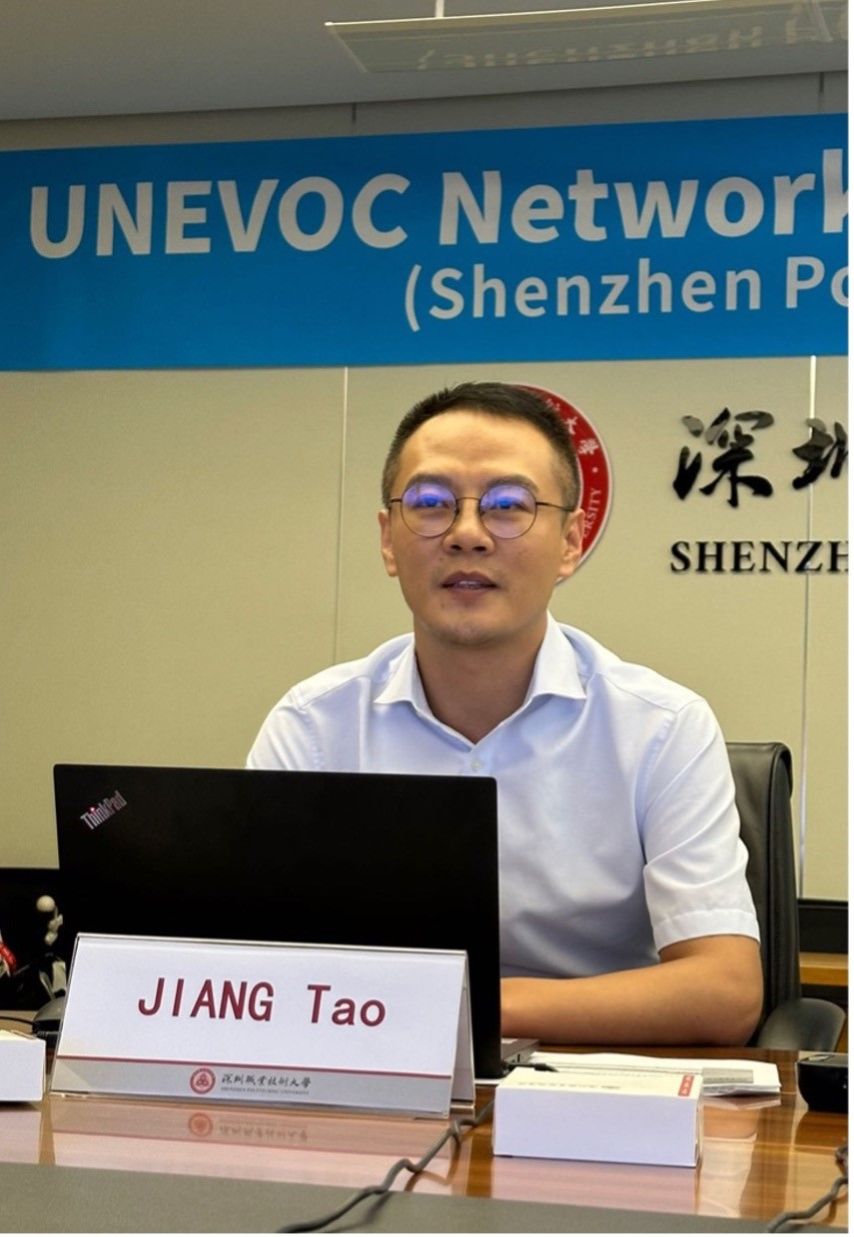In this week, the UNEVOC Network Coaction Initiative 2023 led by the UNEVOC Centre at Shenzhen Polytechnic University (SZPU) continued its mission of advancing capacity building for digital transformation in TVET sectors. The second webinar in this series, held on September 28, 2023, was themed on ‘Digital Transformation and Development of TVET Programmes and Curricula’. The aim was to provide TVET leaders and educators with innovative strategies and promising practices to bolster the development of digital-related programmes and courses, or update traditional modes of delivery. Five partner UNEVOC Centres attended the webinar, including National Skills University Islamabad (NSU) of Pakistan, Preah Kossomak Polytechnic Institute (PPI) of Cambodia, Temasek Polytechnic (TP) of Singapore, Universiti Tun Hussein Onn Malaysia (UTHM) of Malaysia, and Zhejiang Technical Institute of Economics (ZJTIE) of China.

(Group photo of webinar participants)
The webinar commenced with a Learning Sharing session. Dr. Mediha Khalid from NSU and Mr. CHEA Sokchenda from PPI shared key takeaways and reflections from the previous webinar in this series.

(Sharing by Dr. Mediha Khalid (left) and Mr. CHEA Sokchenda)
The main session featured three Expert Reports. First, Prof. CHI Ruinan, Deputy Dean of the School of Artificial Intelligence (AI) at SZPU, presented on the topic of ‘Development of Emerging Digital Programmes: The Case of AI Programme Cluster at SZPU’. Prof. CHI elaborated on the rationale and methodologies of developing digital programmes in the context of AI-driven industrial transformation. Stressing the delivery of TVET programmes to be in sync with industry needs, Prof. CHI introduced the School of AI’s cluster of programmes, which are closely aligned with specific sectors within the AI industry and have strong partnerships with leading companies in those sectors. Crucially, Prof. CHI offered four approaches for TVET institutions to transform digital-related programmes. These approaches include university-industry collaboration, industry-based curriculum development, teachers’ dual-profession capacity building combining pedagogical skills and industrial expertise, and establishing digital practical training environments.

(Prof. CHI Ruinan, Deputy Dean of the School of AI at SZPU, making a presentation)
The second presentation was made by Prof. CUI Hongwei, Deputy Dean of the School of Automotive and Transportation Engineering at SZPU, on the topic of ‘Digital Transformation of Traditional TVET Programmes: The Case of Automotive Programmes’. Prof. CUI highlighted the rapid changes occurring in the automotive industry as ‘intelligence, electrification, connectivity, and shared mobility’ reshape its value chain and business models. Consequently, traditional automotive TVET programmes require swift reform and innovation to adapt to these evolving industry needs. Prof. CUI emphasized the significance of maintaining an industry- and job-oriented approach in the development of TVET programmes, staying abreast of the latest industry advancements, and understanding talent demands and skills requirements. He shared how SZPU successfully transformed their automotive programs by leveraging digital technologies to upgrade teaching and learning methods, foster university-industry collaboration, and enhance practical training opportunities.

(Prof. CUI Hongwei, Deputy Dean of the School of Automotive and Transportation Engineering at SZPU, making a presentation)
The third presentation focused on TVET curriculum development. Dr. JIANG Tao from the TVET Curriculum Research Center at SZPU presented on the topic of ‘Digital Transformation of TVET Curricula: The Case of DevelopingNational First-Class Courses (“Jinke”)’. Dr. JIANG introduced SZPU’s strategies and experience in successfully implementing multipleNational First-Class Courses in TVET. These courses, popularly known as ‘Jinke’ in Chinese, meaning ‘golden courses’, are top-tier, quality online courses which are the outcome of an education policy in China that aims to improve the quality of higher education nation-wide. Many of the courses developed by SZPU are massive open online courses (MOOCs) or virtual simulation experiment courses, which applied technologies such as VR, AR, 3D modelling, and human-computer interaction to enhance student experience and learning outcomes.

(Dr. JIANG Tao, Researcher in TVET Curriculum Research Center at SZPU, making a presentation)
In the Group Discussion session, participants shared examples of emerging digital TVET programmes from their respective institutions and countries. They also discussed various challenges that TVET institutions could encounter when carrying out digital transformation of traditional programmes and explored possible solutions.
Overall, the second webinar of the UNEVOC Network Coaction Initiative 2023 offered a wealth of experience and diverse perspectives on implementing digital transformation for TVET programmes and curricula. This project allowed SZPU to share its expertise in digital transformation with regional partners while fostering inter-institutional collaboration, thereby promoting student-centered, industry-oriented, and promising TVET practices.
